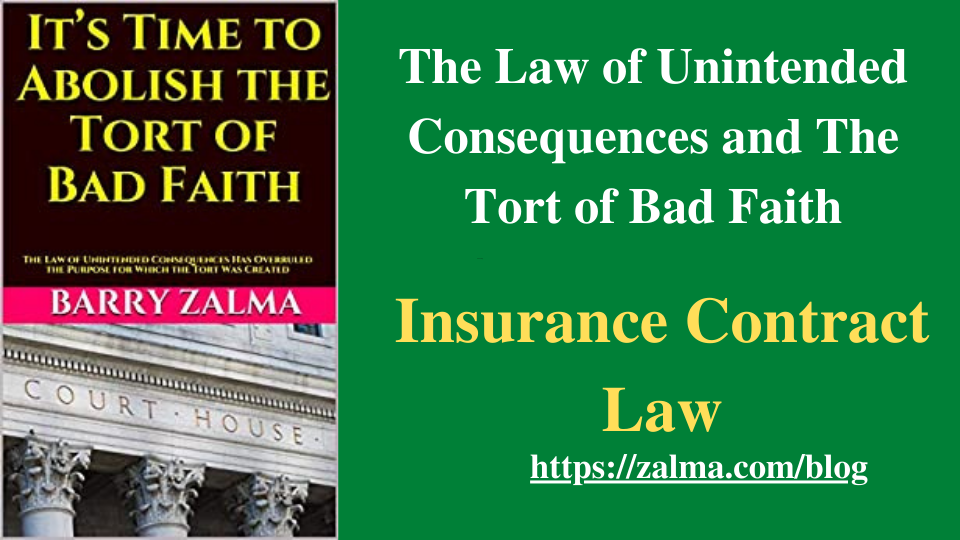-
News Feed
- EXPLORE
-
Pages
-
Groups
-
Events
-
Blogs
-
Marketplace
-
Offers
-
Jobs
-
Developers
The Law of Unintended Consequences and the Tort of Bad Faith

Insurance Contract Law
Read the full article at https://lnkd.in/gFe2jYAk and see the full video at https://lnkd.in/gZKupNnu and at https://lnkd.in/gYX-tJQe and at https://zalma.com/blog plus more than 2450 posts.
In a typical contract, one party has a duty to perform (construct a building, deliver goods, convey real estate, pay indemnity) and the other party has a duty to pay money or perform a task. Breach by the performer may take the form of nonperformance, defective performance, or delay in performance.
The primary purpose of damages for breach of a contract is to protect the promisee’s expectation interest in the promisor’s performance. Damages should put the plaintiff in as good a position as if the defendant had fully performed as required by the contract. Damages should never provide a profit to the non-breaching party.Insurance, like all parts of modern society, is subject to the deprivations of the law of unintended consequences.
In the USA alone people pay to insurers more than $1.2 trillion dollars in premiums and insurers pay out in claims as much or more than they take in. Profit margins are small because competition is fierce and a year’s profits can be lost to a single firestorm, earthquake, hurricane, flood or unexpected bad faith law suit.
The tort of bad faith, designed to help the innocent, resulted in punishing the honest and professional insurers, rewarding the insurers who acted in bad faith with profit. Also, because of the fear of punishment with bad faith suits, insurers allowed many frauds to succeed rather than face potential tort damages. Contract terms and conditions that were clear and unambiguous were ignored to avoid litigation.
In the more than 70 years of application across the United States, the tort of bad faith has not, in my opinion, had a salutary effect on the insurance business or the people and businesses who are insured. Insurance costs have increased more than is reasonable or necessary so that sufficient funds exist to pay claims and tort damages from those insureds who believe they were wronged.
Unfortunately, few insurers are willing to take a chance on convincing a jury that the decision to deny the claim was fairly debatable or that the decision made was as a result of a genuine dispute. Mudslides in Southern California from hills denuded by wildfires, clearly excluded, are being paid because of fear of claims of bad faith and an aggressive department of insurance that construes a mudslide as a loss due to fire.
(c) 2022 Barry Zalma & ClaimSchool, Inc.
Barry Zalma, Esq., CFE, is available at http://www.zalma.com and [email protected].
Subscribe to Zalma on Insurance at locals.com https://zalmaoninsurance.local.com/subscribe.
Subscribe to Excellence in Claims Handling at https://barryzalma.substack.com/welcome.

We are 100% funded for October.
Thanks to everyone who helped out. 🥰
Xephula monthly operating expenses for 2024 - Server: $143/month - Backup Software: $6/month - Object Storage: $6/month - SMTP Service: $10/month - Stripe Processing Fees: ~$10/month - Total: $175/month
- Art
- Causes
- Crafts
- Crime
- Dance
- Drinks
- Film
- Finance
- Fitness
- Food
- Games
- Gardening
- Health
- Home
- Literature
- Music
- Networking
- Paranormal
- Other
- Politics
- History
- News
- Party
- Science
- Religion
- Shopping
- Sports
- SyFy
- Politically Incorrect
- Philosophy
- Theater
- Technology
- Wellness



